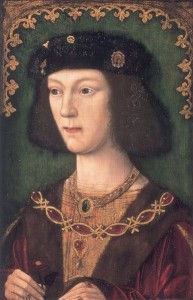 On 12th January 1510, Henry VIII jousted for the first time as king at a private joust at Richmond Park. He had become king following his father Henry VII’s death on 21st April 1509 and was a keen sportsman, excelling at the joust.
On 12th January 1510, Henry VIII jousted for the first time as king at a private joust at Richmond Park. He had become king following his father Henry VII’s death on 21st April 1509 and was a keen sportsman, excelling at the joust.
On 29th May 1510, Luis Caroz de Villaragut wrote to Ferdinand II, Henry’s father-in-law, about Henry VIII’s love of jousting and his skill at it:
“The King of England amuses himself almost every day of the week with running the ring, and with jousts and tournaments on foot, in which one single person fights with an appointed adversary. Two days in the week are consecrated to this kind of tournament, which is to continue till the Feast of St. John, and which is instituted in imitation of Amadis and Lanzilote, and other knights of olden times, of whom so much is written in books. The combatants are clad in breast plates, and wear a particular kind of helmet. They use lances of fourteen hands breadth long, with blunt iron points. They throw these lances at one another, and fight afterwards with two-handed swords, each of the combatants dealing twelve strokes. They are separated from one another by a barrier which reaches up to the girdle, in order to prevent them from seizing one another and wrestling. There are many young men who excel in this kind of warfare, but the most conspicuous amongst them all, the most assiduous, and the most interested in the combats is the King himself, who never omits being present at them.”1
The king and his good friend William Compton attended the joust on 12th January in disguise but this led to panic when one of the disguised knights was seriously injured in the joust and a man who knew that the king was taking part cried out “God save the king!”2
Can you imagine the panic that ensued?!
You can read more about what happened in my article 12 January 1510 – Panic at the joust.
Notes and Sources
- Calendar of State Papers, Spain, Volume 2, 1509-1525, 45, Luis Caroz De Villaragut, to King Ferdinand the Catholic.
- Hall, Edward, Hall’s Chronicle, p.513.